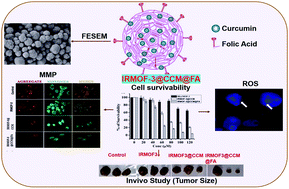Fabrication of curcumin-loaded folic acid-tagged metal organic framework for triple negative breast cancer therapy in in vitro and in vivo systems†
Abstract
Curcumin has shown therapeutic activity against triple-negative breast cancer (TNBC) cells, but it shows low efficacy and low bioavailability when administered as a free drug. We have developed a general synthesis strategy to encapsulate the natural molecule curcumin in monodispersed isoreticular nanoscale metal organic framework (NMOF-3) nanoparticles for targeted drug delivery in triple-negative breast cancer cells (TNBC). The cytotoxicity of IRMOF-3, curcumin-loaded IRMOF-3 (IRMOF-3@CCM) and folic acid-conjugated curcumin-loaded IRMOF-3 (IRMOF-3@CCM@FA) in human and mice TNBC were tested. IRMOF3@CCM@FA induces apoptosis by upregulating of Bax and downregulating of Bcl-2, and it further upregulates JNK and p53 in human TNBC cells. Simultaneously, we studied their effects in mice bearing TNBC induced by 4T1 cells. In in vivo studies, mice receiving targeted delivery of curcumin had increased survivability and reduced tumor volume compared with those observed for mice receiving non-targeted delivery. Our results highlight that folate-conjugated curcumin-loaded IRMOF-3 may be a useful therapeutic agent to treat TNBC.



 Please wait while we load your content...
Please wait while we load your content...